| Margraves, Dukes, Archdukes and Emperors of Austria | |
|---|---|
 | |
| Details | |
| Style | Archduchy period: |
| First monarch | Leopold I (as margrave) |
| Last monarch | Charles I (as emperor) |
| Formation | 21 July 976 |
| Abolition | 12 November 1918 |
| Residence | Hofburg, Vienna (from the ducal period onwards) |
From 976 until 1246, the Margraviate of Austria and its successor, the Duchy of Austria, was ruled by the House of Babenberg. At that time, those states were part of the Holy Roman Empire. From 1246 until 1918, the duchy and its successor, the Archduchy of Austria, was ruled by the House of Habsburg. Following the defeat of Austria-Hungary in World War I, the titles were abolished or fell into abeyance with the erection of the modern Republic of Austria.
Margraves and Dukes of Austria under the House of Babenberg
[edit]The March of Austria, also known as Marcha Orientalis, was first formed in 976 out of the lands that had once been the March of Pannonia in Carolingian times. The oldest attestation dates back to 996, where the written name "ostarrichi" occurs in a document transferring land in present-day Austria to a Bavarian monastery. In 1156, the Privilegium Minus elevated the march to a duchy, independent of the Duchy of Bavaria.
| Name | Born | Reign | Ruling part | Consort | Death | Notes |
|---|---|---|---|---|---|---|
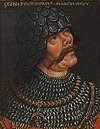 Leopold I the Illustrious Leopold I the Illustrious
|
c. 940 Son of Berthold of Nordgau or Arnulf, Duke of Bavaria |
21 July 976 – 10 July 994 | March of Austria | Richardis of Sualafeldgau nine children |
10 July 994 Würzburg aged 53-54 |
Founder of the Babenbergs. |
 Henry I the Strong Henry I the Strong
|
c. 965 (?) First son of Leopold I and Richardis of Sualafeldgau |
10 July 994 – 23 June 1018 | March of Austria | Unmarried | 23 June 1018 aged 53-54 |
In his reign (996), the name Ostarrichi (later Osterreich, Austria) appeared for the first time to designate the land he ruled. |
 Adalbert I the Victorious Adalbert I the Victorious
|
c. 985 Third son of Leopold I and Richardis of Sualafeldgau |
23 June 1018 – 26 May 1055 | March of Austria | Glismod of West-Saxony no children Frozza Orseolo c.1025? one child |
26 May 1055 Melk aged 69-70 |
Expanded his Bavarian margraviate to the Morava and Leitha rivers. |
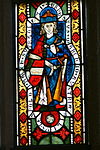 Ernest the Brave Ernest the Brave
|
1027 Son of Adalbert I and Frozza Orseolo |
26 May 1055 – 10 June 1075 | March of Austria | Adelaide of Eilenburg 1060 three children Swanhilde of Ungarnmark 1072 no children |
10 June 1075 aged 47-48 |
Expanded his Bavarian margraviate to the Morava and Leitha rivers. |
 Leopold II the Fair Leopold II the Fair
|
1050 Son of Ernest and Adelaide of Eilenburg |
10 June 1075 – 12 October 1095 | March of Austria | Ida of Formbach-Ratelnberg 1065 eight children |
12 October 1095 Gars am Kamp aged 44-45 |
Supported the Gregorian Reforms, and was an active opponent to Henry IV, Holy Roman Emperor during the Investiture Controversy. |
 Leopold III the Saint Leopold III the Saint
|
1073 Gars am Kamp Son of Leopold II and Ida of Formbach-Ratelnberg |
12 October 1095 – 15 November 1136 | March of Austria | Maria of Perg no children Agnes of Germany 1106 eighteen children |
15 November 1136 Klosterneuburg aged 62-63 |
His second marriage brought the margraviate of Austria closer to the Imperial family, which raised the importance of the Babenbergs. Consequently, more royal rights were granted to Austria. |
 Adalbert II the Pious Adalbert II the Pious
|
1106 First son of Leopold III and Agnes of Germany |
15 November 1136 – 9 November 1137 | March of Austria | Adelaide of Poland 1128/29 no children Hedwig of Hungary 1132 no children |
9 November 1137 aged 30-31 |
Usually not counted as margrave,[1] despite being cited as so as early as 1119. Nevertheless, it's possible that he ruled for a year, or at least as claimant to his younger brother Leopold. If he ruled, he left no children. Knighted in 1125[2] |
 Leopold IV the Generous Leopold IV the Generous
|
1108 Third son of Leopold III and Agnes of Germany |
9 November 1137 – 18 October 1141 | March of Austria | Maria of Bohemia 28 September 1138 no children |
18 October 1141 Niederalteich aged 32-33 |
Also Duke of Bavaria, title given to him after his struggles with the House of Welf. |
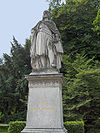 Henry II Jasomirgott[3] Henry II Jasomirgott[3]
|
1107 Second son of Leopold III and Agnes of Germany |
18 October 1141 – 13 January 1177 | March of Austria (until 1156) Duchy of Austria (from 1156) |
Gertrude of Süpplingenburg 1 May 1142 one child Theodora Komnene 1148 three children |
13 January 1177 Vienna aged 69-70 |
Succeeded his younger brother in Austria and also as Duke of Bavaria. Moved his capital to Vienna. In 1156, Austria was raised to a Duchy. |
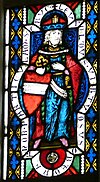 Leopold V the Virtuous Leopold V the Virtuous
|
1157 First son of Henry II and Theodora Komnene |
13 January 1177 – 31 December 1194 | Duchy of Austria | Helena of Hungary 1174 four children |
31 December 1194 Graz aged 36-37 |
Children of Henry II, divided Austria: Leopold V kept the main duchy and annexed the Duchy of Styria to his domain in 1192. He also gave his brother Henry the so-called Duchy of Mödling (title Henry used from 1205[4]), which spanned from Liesing to Piesting and Bruck an der Leitha. Henry I and his descendants became mostly interested in the arts. |
 Henry I the Elder Henry I the Elder
|
1158 Second son of Henry II and Theodora Komnene |
13 January 1177 – 31 August 1223 | Duchy of Mödling | Richeza of Bohemia 1177 one child |
31 August 1223 aged 64-65 | |
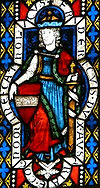 Frederick I the Catholic Frederick I the Catholic
|
1175 First son of Leopold V and Helena of Hungary |
31 December 1194 – 16 April 1198 | Duchy of Austria | Unmarried | 16 April 1198 The Holy Land aged 22-23 |
Left no children. |
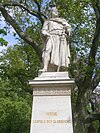 Leopold VI the Glorious Leopold VI the Glorious
|
15 October 1176 Second son of Leopold V and Helena of Hungary |
16 April 1198 – 28 July 1230 | Duchy of Austria | Theodora Angelina 1203 seven children |
28 July 1230 San Germano aged 53 |
|
 Henry II the Profane Henry II the Profane
|
1208 First son of Leopold VI and Theodora Angelina |
31 August 1223 – 29 November 1228 | Duchy of Mödling | Agnes of Thuringia 29 November 1225 Nuremberg one child |
29 November 1228 aged 19-20 |
Nephew of Henry I, apparently succeeded him as ruler, preceding his cousin (Henry I's son). He is referenced as Heinricus iuvenis dux who died in 1227,[5] and Henrici de Medlico (Henry of Mödling).[6] |
 Henry III the Younger Henry III the Younger
|
1182 Son of Henry I and Richeza of Bohemia |
29 November 1228 – 1236 | Duchy of Mödling | Unmarried | 1236 aged 53-54 |
After his death the duchy reverted to his cousin Gertrude, daughter of Henry II. |
 Frederick II the Quarrelsome Frederick II the Quarrelsome
|
25 April 1211 Wiener Neustadt Second son of Leopold VI and Theodora Angelina |
28 July 1230 – 15 June 1246 | Duchy of Austria | Eudokia Sophia Laskarina Angelina[7] no children Agnes of Merania 1229 no children |
15 June 1246 Leitha aged 35 |
His troublesome marriages with no children opened a succession crisis in Austria. |
 Gertrude Gertrude
|
1226 Daughter of Henry II, Duke of Mödling and Agnes of Thuringia |
1236 – 4 October 1250 | Duchy of Mödling | Vladislaus of Bohemia 1246 no children Herman VI, Margrave of Baden 1248 two children Roman Danylovych 1252 one child |
24 April 1288 aged 61-62 |
Heiress of Mödling. After her cousin's death in 1246, she was the first to claim the duchy. She was associated with her first two husbands. However, as Herman of Baden failed to defeat the opposition of Austrian nobility, her rule weakened substantially, giving them minimal control over the duchies. Her first refusal of a third marriage with the brother of William II of Holland, combined with the occupation of Austria by her cousin Margaret and Ottokar of Bohemia in 1252, halted her claims. Although she was even given a part of Styria in 1254, she did not forswear her claim; her territorial portion was taken away from her in 1267. |
| 15 June 1246 – 4 October 1250 1254-1267 |
Duchy of Austria (in only part of Styria in 1254-67) | |||||
| Vladislaus of Bohemia | 1227 Son of Wenceslaus I of Bohemia and Kunigunde of Hohenstaufen |
15 June 1246 – 3 January 1247 | Duchy of Austria (claimant as consort) |
Gertrude 1246 no children |
3 January 1247 Leitha aged 19-20 | |
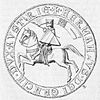 Herman VI, Margrave of Baden Herman VI, Margrave of Baden
|
c.1226 Son of Herman V, Margrave of Baden and Irmengard of the Palatinate |
1248 – 4 October 1250 | Duchy of Austria (claimant as consort) |
Gertrude 1248 two children |
4 October 1250 aged 23-24 | |
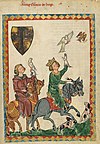 Frederick I, Margrave of Baden Frederick I, Margrave of Baden
|
1249 Alland Son of Herman VI, Margrave of Baden and Gertrude |
1254 – 1267 | Duchy of Austria (claimant as heir; in only part of Styria) |
Unmarried | 29 October 1268 Naples aged 18-19 | |
 Margaret Margaret
|
1204 Daughter of Leopold VI and Theodora Angelina |
6 May 1252 – 29 October 1266 | Duchy of Austria (from 1261 only in Krumau am Kamp) |
Henry (VII) of Germany 29 November 1225 Nuremberg two children Ottokar II of Bohemia 11 February 1252 Hainburg an der Donau (annulled 1261) no children |
29 October 1266 Krumau am Kamp aged 61-62 |
Margaret and her husband, future King of Bohemia, invaded Austria in 1252 and were successfully proclaimed Dukes of Austria. After the annullment of their marriage, Margaret retired and Ottokar continued his rule until 1276, when he signed away his claims in Austria in favor of Rudolph of Habsburg. The matter would be settled with his defeat and death at the Battle on the Marchfeld (1278). |
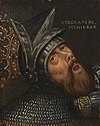 Premislaus Ottokar II of Bohemia The Iron and Golden King Premislaus Ottokar II of Bohemia The Iron and Golden King
|
1233 Městec Králové Son of Wenceslaus I of Bohemia and Kunigunde of Hohenstaufen |
6 May 1252 – 1261 | Duchy of Austria (claimant as consort) |
Margaret 11 February 1252 Hainburg an der Donau (annulled 1261) no children Kunigunda Rostislavna of Halych 25 October 1261 Pressburg three children |
26 August 1278 Dürnkrut aged 44-45 | |
| 1261 – November 1276 | Duchy of Austria |
Dukes and Archdukes of Austria under the House of Habsburg
[edit]Count Rudolf of Habsburg, elected as king of Germany (1273), was able during the years 1276–78 to decisively defeat his main rival, the Bohemian king Ottokar II, and to regain his Austrian domains back for the Empire. By his imperial authority, Rudolf later (1282) invested his sons Albrecht and Rudolf with the duchies of Austria and Styria, thereby securing them for the House of Habsburg. Austria remained under Habsburg rule for more than 600 years, forming the core of the Habsburg monarchy and the present-day country of Austria.
The most important Austrian rulers until the Victory at Vienna in 1683 are described in the book Symmetria iuridico Austriaca.
Possessions (and partitions) of Austria under Habsburg domain
[edit]| Duchy of Austria (1291–1358) | |||
Duchy of Austria, Duchies of Styria and Carinthia, and March of Carniola Rudolf IV (1358–1363) | |||
Duchy of Austria, Duchies of Styria and Carinthia, March of Carniola (raised to Duchy of Carniola in 1364), and County of Tyrol Rudolf IV (1363–1365) Albert III and Leopold III (1365–1379) | |||
| Duchy of Lower Austria Albert III (1379–1457) Albert IV (1395–1404) Albert V (1404–1439) Ladislaus (1440–1457) |
Duchies of Inner and Further Austria and County of Tyrol Leopold III (1379–1386) William and Leopold IV (1386–1406) | ||
| Duchy of Inner Austria Ernest (1406–1424) Frederick V and Albert VI (1424–1453) |
Duchy of Further Austria Leopold IV (1406–1411) |
County of Tyrol Frederick IV (1406–1411) | |
| Duchy of Further Austria and County of Tyrol Frederick IV (1411–1439) Sigismund (1439–1453) | |||
| Archduchy of Inner Austria Frederick V and Albert VI (1453–1463) Frederick V (1463–1490) |
Archduchy of Further Austria Sigismund (1453–1490) | ||
| Archduchy of Austria (Inner Austrian line) Frederick V (1490–1493) Maximilian I (1493–1519) Charles I (1519–1521/1556) Ferdinand I (1521/1556–1564) | |||
| Archduchy of Lower and Upper Austria Maximilian II (1564–1576) Rudolf V (1576–1608) Matthias (1608–1619) |
Archduchy of Inner Austria Charles II (1564–1590) Ferdinand (HRE) II (1590–1619) |
Archduchy of Further Austria (with County of Tyrol) Ferdinand II (1564–1595) Matthias (1595–1612) Maximilian III (1612–1618) Matthias (1618–1619) | |
| Archduchy of Austria (Inner Austrian line) Ferdinand (HRE) II (1619–1623) | |||
| Archduchy of Lower and Inner Austria Ferdinand (HRE) II (1623–1637) Ferdinand IV (1637–1657) Leopold VI (1657–1665) |
Archduchy of Further Austria Leopold V (1623–1632) Ferdinand Charles (1632–1662) Sigismund Francis (1662–1665) | ||
| Archduchy of Austria (Lower/Inner Austrian line) Leopold VI (1665–1705) Joseph I (1705–1711) Charles III (1711–1740) Maria Theresa and Francis I Stephen (1740–1765) Maria Theresa and Joseph II (1765–1780) (Habsburg-Lorraine line) Joseph II (1780–1790) Leopold VII (1790–1792 Francis II (1792–1804) | |||
Table of rulers
[edit]| Ruler | Born | Reign | Ruling part | Consort(s) Child(ren) |
Death | Notes |
|---|---|---|---|---|---|---|
 Rudolph I |
1 May 1218 Sasbach am Kaiserstuhl Son of Albert IV, Count of Habsburg and Hedwig of Kyburg |
November 1276 – December 1282 |
Duchy of Austria | Gertrude Anna of Hohenberg 1253 Elsass ten children Isabella of Burgundy 6 February 1284 Remiremont no children |
15 July 1291 Speyer aged 73 |
Brought the rule of Austria to the Habsburgs after definitively defeating Ottokar II of Bohemia between 1276 and 1278. |
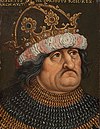 Albert I |
July 1255 Vienna Eldest son of Rudolf I and Gertrude of Hohenberg |
December 1282 – 1 May 1308 |
Duchy of Austria | Elisabeth of Gorizia-Tyrol 20 December 1274 Vienna twelve children |
1 May 1308 Windisch aged 52 |
Sons of Rudolf I, Albert I and Rudolf II, co-ruled in Austria only one year (1282–83) when the sole rule was entrusted by the Treaty of Rheinfelden to Albert alone according to the principle of primogeniture. Albert was elected as king of Germany in 1298, and that same year he associated his own eldest son, Rudolf III in Austria. Rudolf III was also elected King of Bohemia in 1306, but predeceased his father, dying in the following year. Albert himself was assassinated by his nephew John Parricida. |
 Rudolf II the Debonair |
July 1270 Rheinfelden Third son of Rudolph I and Gertrude of Hohenberg |
December 1282 – 1283 |
Duchy of Austria | Agnes of Bohemia March 1289 Prague one child |
10 May 1290 Prague aged 20 | |
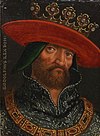 Rudolf III the Good |
c. 1281 Vienna Eldest son of Albert I and Elisabeth of Gorizia-Tyrol |
21 November 1298 – 3/4 July 1307 |
Duchy of Austria | Blanche of France 25 May 1300 one child Elisabeth Richeza of Poland 16 October 1306 Prague no children |
3/4 July 1307 Horažďovice aged 26 | |
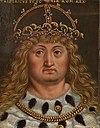 Frederick I/III the Fair[8] |
c. 1289 Vienna Second son of Albert I and Elisabeth of Gorizia-Tyrol |
1 May 1308 – 13 January 1330 |
Duchy of Austria | Isabella of Aragon 11 May 1315 Ravensburg three children |
13 January 1330 Gutenstein aged 41 |
Younger brothers of Rudolf III, and co-rulers in Austria and Styria. Leopold, despite being younger than Frederick, was the one who primarily inherited the County of Habsburg, the oldest land of the family, and it was only after his death (1326) that Frederick came to rule there. In 1314, Frederick was elected King of the Romans, firstly as rival of Louis IV, Holy Roman Emperor, and then accepting co-rulership. |
 Leopold I the Glorious[9] |
4 August 1290 Vienna Third son of Albert I and Elisabeth of Gorizia-Tyrol |
1 May 1308 – 28 February 1326 |
Duchy of Austria | Catherine of Savoy 26 May 1315 Basel two children |
28 February 1326 Strassburg aged 35 | |
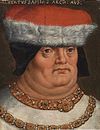 Albert II the Wise |
12 December 1298 Habsburg Castle Fourth son of Albert I and Elisabeth of Gorizia-Tyrol |
13 January 1330 – 16 August 1358 |
Duchy of Austria | Joanna of Pfirt 15 February 1324 Vienna six children |
16 August 1358 Vienna aged 59 |
Younger brothers of the predecessors, and co-rulers. Albert established the primogeniture law into their domains. He also brought Carinthia and Carniola into Habsburg rule and laid an unsuccessful siege to Zürich. Otto administered the Swabian Habsburg lands. Otto's minor sons, Frederick (II) and Leopold (II), succeeded him in the co-rulership as titular dukes (1339–1344). |
 Otto I the Merry |
23 July 1301 Vienna Seventh son of Albert I and Elisabeth of Gorizia-Tyrol |
13 January 1330 – 17 February 1339 |
Duchy of Austria | Elisabeth of Bavaria 15 May 1325 Straubing two children Anne of Bohemia 16 February 1335 Znaim no children |
17 February 1339 Neuberg an der Mürz aged 37 | |
 Rudolf IV the Founder |
1 November 1339 Vienna Eldest son of Albert II the Wise and Joanna of Pfirt |
16 August 1358 – 27 July 1365 |
Duchy of Austria | Catherine of Bohemia 13 July 1356 Vienna no children |
27 July 1365 Milan aged 25 |
After the unchanging of privileges for the Habsburgs in the decree of the Golden Bull in 1356, Rudolf gave the order to draw up the Privilegium Maius, a fake document to empower the Austrian rulers. He was the first to style himself as "Archduke", a title which was only made official in 1453. Rudolf also brought Tyrol into the Habsburg domain. |
| The Privilegium Maius, fabricated by Rudolf in 1359, attempted to invest the Dukes of Austria with the special position of an "Archduke". This title was frequently used by Ernest the Iron and other Dukes but not recognized by other princes of the Holy Roman Empire until Frederick V became Emperor and confirmed the Privilegium in 1453. After the death of Rudolf in 1365, his brothers Albert and Leopold succeeded him together, but divided their possessions between them in the Treaty of Neuberg of 1379:
| ||||||
| Ruler | Born | Reign | Ruling part | Consort(s) Child(ren) |
Death | Notes |
 Albert III the Pigtail |
9 September 1349 Vienna Third son of Albert II the Wise and Joanna of Pfirt |
29 July 1365 – 25 September 1379 |
Duchy of Austria | Elisabeth of Bohemia after 19 March 1366 Vienna no children Beatrice of Nuremberg 4 March 1375 Vienna one child |
29 August 1395 Laxenburg aged 45 |
Brothers of the predecessor, divided their domains in 1379. Leopold himself lost his life fighting in the Battle of Sempach (1386), a turning point that established the growth of the Swiss Confederacy and the effective decline of Habsburg power in their Swiss homeland. |
| 25 September 1379 – 29 August 1395 |
Duchy of Lower Austria | |||||
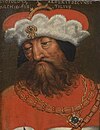 Leopold III the Just[10] |
1 November 1351 Vienna Fourth son of Albert II the Wise and Joanna of Pfirt |
29 July 1365 – 25 September 1379 |
Duchy of Austria | Viridis Visconti 23 February 1365 Vienna six children |
9 July 1386 Sempach aged 34 | |
| 25 September 1379 – 9 July 1386 |
Duchies of Inner and Further Austria with County of Tyrol | |||||
 William the Courteous |
c. 1370 Vienna Eldest son of Leopold the Just and Viridis Visconti |
9 July 1386 – 15 July 1406 |
Duchies of Inner and Further Austria with County of Tyrol | Joan II of Naples 13 November 1401 Vienna no children |
15 July 1406 Vienna aged 36 |
Co-ruled with his brother Leopold IV. Also held regency in Lower Austria 1404–1406. |
 Leopold IV the Fat |
c. 1371 Vienna Second son of Leopold the Just and Viridis Visconti |
9 July 1386 – 15 July 1406 |
Duchies of Inner and Further Austria with County of Tyrol | Catherine of Burgundy 15 August 1393 Vienna no children |
3 June 1411 Vienna aged 40 |
Also held regency in Lower Austria 1404–1411. After the partition of 1406, kept Further Austria. |
| 15 July 1406 – 3 June 1411 |
Duchy of Further Austria | |||||
 Albert IV the Patient |
19 September 1377 Vienna Only son of Albert the Pigtail and Beatrice of Nuremberg |
29 August 1395 – 14 September 1404 |
Lower Austria | Joanna Sophia of Bavaria 24 April 1390 Vienna two children |
14 September 1404 Klosterneuburg aged 26 |
His rule was marked by tensions and conflicts with the Leopoldinian line and the Luxemburg dynasty. |
| Regencies of William, Duke of Austria and Leopold IV, Duke of Austria (1404–1411) | Succeeded as a minor, under guardianship of his Leopoldinian uncles. He was elected, in 1437–38, as King of Bohemia and King of Hungary, and also as King of Germany, beginning a three centuries long succession of Habsburg rulers as Kings of the Romans and Holy Roman Emperors. | |||||
 Albert V the Magnanimous |
16 August 1397 Vienna Only son of Albert IV and Joanna Sophia of Bavaria |
14 September 1404 – 27 October 1439 |
Duchy of Lower Austria | Elizabeth of Luxembourg 26 April 1422 Vienna three children |
27 October 1439 Neszmély aged 42 | |
In 1406, after the death of William, the living brothers of the Leopoldinian Line made a new division of their territories:
| ||||||
| Ruler | Born | Reign | Ruling part | Consort(s) Child(ren) |
Death | Notes |
 Ernest the Iron |
c. 1377 Bruck an der Mur Third son of Leopold the Just and Viridis Visconti |
15 July 1406 – 10 June 1424 |
Duchy of Inner Austria | Margaret of Pomerania 14 January 1392 Bruck an der Mur no children Cymburgis of Masovia 25 January 1412 Kraków nine children |
10 June 1424 Bruck an der Mur aged 47 |
In 1414, he became the last Duke to be enthroned according to Carantanian traditional rite at the Prince's Stone in Carinthia, and from that time on called himself Archduke. Beside Rudolf IV, he was the only one who used the title before it became official in 1453. |
 Frederick IV of the Empty Pockets[11] |
c. 1382 Fourth son of Leopold the Just and Viridis Visconti |
15 July 1406 – 3 June 1411 |
County of Tyrol | Elisabeth of the Palatinate 24 December 1407 Innsbruck one child Anna of Brunswick-Wolfenbüttel 11 June 1411 Innsbruck four children |
24 June 1439 Innsbruck aged 57 |
Also held regency in Inner Austria 1424–1435. Because he sided with Antipope John XXIII, the Council of Constance stripped him of the remaining important Swiss possessions of the family, which went to the Swiss Confederacy. |
| 3 June 1411 – 24 June 1439 |
County of Tyrol with Further Austria | |||||
| Vacant 1439–1440 | ||||||
| Regency of Frederick V, Duke of Austria (1440–1452) | Succeeded as a minor, under the guardianship of his Ernestine cousin. His death without descendants ended the Albertinian line. The he domains which he inherited in Bohemia and Hungary were lost, and were only recovered during the reign of Ferdinand I, Holy Roman Emperor. | |||||
 Ladislaus the Posthumous |
22 February 1440 Komárom Only son of Albert V and Elizabeth of Luxembourg |
22 February 1440 – 23 November 1457 |
Duchy of Lower Austria (1440–1453) Archduchy of Lower Austria (1453–1457) |
Unmarried | 23 November 1457 Prague aged 17 | |
| Lower Austria annexed to Inner Austria | ||||||
| Regency of Frederick V, Duke of Austria (1439–1446) | In 1490 he abdicated his control over his territories, giving way for the reunification of Austria. | |||||
 Sigismund the Rich |
26 October 1427 Innsbruck Second son of Frederick IV and Anna of Brunswick |
24 June 1439 – 1490 |
Duchy of Further Austria with County of Tyrol (1439–1453) Archduchy of Further Austria with County of Tyrol (1453–1490) |
Eleanor of Scotland 12 February 1449 Innsbruck one child Katharina of Saxony 24 February 1484 Innsbruck no children |
4 March 1496 Innsbruck aged 68 | |
| Further Austria and Tyrol annexed to Inner Austria | ||||||
| Ruler | Born | Reign | Ruling part | Consort(s) Child(ren) |
Death | Notes |
| Regency of Frederick IV, Duke of Austria (1424–1435) | Sons of Ernest I, ruled jointly. Occasionally, Albert revolted against Frederick, occupying until his death the lands known today as Upper Austria and Lower Austria. On his part, Frederick was elected, between 1440 and 1452, King of the Romans and Holy Roman Emperor. With this dignity, he conceded and made official, in 1453, the Habsburg title of Archduke. He officially elevated the Duchy into an Archduchy, which he came to inherit a few years later. Despite having reunited all of Austria, Frederick's rule wasn't always uncontested: in 1485–1490, Matthias Corvinus, king of Hungary, occupied the proper Duchies of Austria and Styria, claiming the title Archduke of Austria. | |||||
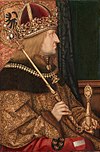 Frederick V the Peaceful |
21 September 1415 Innsbruck First son of Ernest and Cymburgis of Masovia |
10 June 1424 – 1490 |
Duchy of Inner Austria (1424–1453) Archduchy of Inner Austria (1453–1490) |
Eleanor of Portugal 16 March 1452 Rome five children |
19 August 1493 Linz aged 77 | |
| 1490 – 19 August 1493 |
Archduchy of Austria | |||||
 Albert VI the Prodigal |
12 September 1418 Vienna Third son of Ernest and Cymburgis of Masovia |
10 June 1424 – 2 December 1463 |
Duchy of Inner Austria (1424–1453) Archduchy of Inner Austria (1453–1463) |
Mathilde of the Palatinate 1452 Vienna no children |
2 December 1463 Vienna aged 45 | |
 Maximilian I the Last Knight |
22 March 1459 Wiener Neustadt Second son of Frederick V and Eleanor of Portugal |
19 August 1493 – 12 January 1519 |
Archduchy of Austria | Mary of Burgundy 18 August 1477 Ghent three children Anne of Brittany 18 December 1490 Rennes no children Bianca Maria Sforza 16 March 1494 Hall in Tirol no children |
12 January 1519 Wels aged 59 |
In 1490, he reconquered lost Austrian lands after Matthias Corvinus's death and persuaded his cousin Sigismund to cede Tyrol to him.[12][13] Appointed King of the Romans in 1486 and crowned Holy Roman Emperor in 1508. His first marriage allowed him to extend Habsburg domain over the Low Countries. |
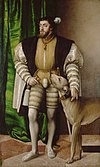 Charles I |
24 February 1500 Ghent Eldest son of Philip I of Castile and Joanna of Castile |
12 January 1519 – 1521/1556 |
Archduchy of Austria | Isabella of Portugal 10 March 1526 Seville seven children |
21 September 1558 Yuste aged 58 |
Grandson of his predecessor. Through his mother he gained, in 1516, the recently unified Kingdom of Spain. He founded a Spanish branch of the Habsburgs that reigned until 1700. In 1519,he inherited the Austrian Archduchy, and was the first solely elected (not crowned) King of the Romans and Holy Roman Emperor (as Charles V). In 1521, he abdicated from Austria. He was succeeded in Austria by his brother, but continued being his brother's overlord until 1556. In this year, Charles abdicated control over all his possessions and retired to the Monastery of Yuste. |
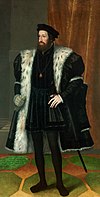 Ferdinand I under Charles I (1521–1556) |
10 March 1503 Alcalá de Henares Second son of Philip I of Castile and Joanna of Castile |
1521/1556 – 25 July 1564 |
Archduchy of Austria | Anne of Bohemia and Hungary 25 May 1521 Linz fifteen children |
25 July 1564 Vienna aged 61 |
Brother of the predecessor. While Charles I's son Philip II of Spain inherited the "Western" possessions (Low Countries, Spain with ultramarine lands, and Italian states), Ferdinand inherited the rest (Austrian possessions), while gaining the kingdoms of Hungary and Bohemia, and came to be elected King of the Romans and Holy Roman Emperor in 1556, after his brother's abdication. |
In 1564, after Ferdinand I's death, the Archduchy was once more divided between his sons:
| ||||||
| Ruler | Born | Reign | Ruling part | Consort(s) Child(ren) |
Death | Notes |
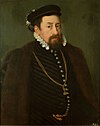 Maximilian II |
31 July 1527 Vienna Eldest son of Ferdinand I and Anne of Bohemia and Hungary |
25 July 1564 – 12 October 1576 |
Archduchy of Lower and Upper Austria | Maria of Spain 13 September 1548 Valladolid sixteen children |
12 October 1576 Regensburg aged 49 |
Maximilian, as the eldest son, was elected King of the Romans and Holy Roman Emperor in 1564, and inherited also the kingdoms of Hungary and Bohemia. |
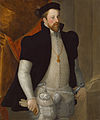 Ferdinand II |
14 June 1529 Linz Second son of Ferdinand I and Anne of Bohemia and Hungary |
25 July 1564 – 24 January 1595 |
Archduchy of Further Austria with County of Tyrol | Philippine Welser ca. 1576 four children Anne Juliana Gonzaga 14 May 1582 Innsbruck three children |
24 January 1595 Innsbruck aged 65 |
Had descendants, but from his morganatic marriage, making them unsuitable for succession; his lands were eventually inherited by the senior Austrian line. |
 Charles II[14] |
3 June 1540 Vienna Fourth son of Ferdinand I and Anne of Bohemia and Hungary |
25 July 1564 – 10 July 1590 |
Archduchy of Inner Austria | Maria Anna of Bavaria (I) 26 August 1571 Vienna fifteen children |
10 July 1590 Graz aged 50 |
Unlike his brother Maximilian, Charles was Catholic and promoted the Counter-Reformation in his domains. |
 Rudolf V |
18 July 1552 Vienna Second son of Maximilian II and Maria of Spain |
12 October 1576 – 1608 |
Archduchy of Lower and Upper Austria | Unmarried | 20 January 1612 Prague aged 59 |
Also Holy Roman Emperor and King of Bohemia and Hungary. He was a patron of the arts, known for his support of Mannerist art. |
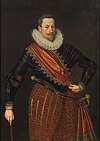 Matthias |
24 February 1557 Vienna Fourth son of Maximilian II and Maria of Spain |
24 January 1595 – 26 June 1612 2 November 1618 – 20 March 1619 |
Archduchy of Further Austria with County of Tyrol | Anna of Tyrol 4 December 1611 Vienna no children |
20 March 1619 Vienna aged 62 |
Also Holy Roman Emperor and King of Bohemia and Hungary. |
| 1608 – 20 March 1619 |
Archduchy of Lower and Upper Austria (with County of Tyrol 1612–1618) | |||||
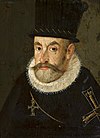 Maximilian III |
12 October 1558 Vienna Sixth son of Maximilian II and Maria of Spain |
26 June 1612 – 2 November 1618 |
Archduchy of Further Austria | Unmarried (served as Grand Master of the Teutonic Order) |
2 November 1618 Vienna aged 60 |
In 1587 stood as a candidate for the throne of the Polish–Lithuanian Commonwealth. He also held the regency of Lower and Upper Austria 1593–1595. |
 Albert VII |
13 November 1559 Wiener Neustadt Fifth son of Maximilian II and Maria of Spain |
20 March – 9 October 1619 |
Archduchy of Lower and Upper Austria | Infanta Isabella Clara Eugenia of Spain 18 April 1599 Valencia no children |
13 July 1621 Brussels aged 61 |
Also Viceroy of Portugal under Philip II of Spain, and ruler of the Low Countries (1598–1621). Ruled a few months as archduke, before abdicating. His abdication resulted in a new reunion of Austria. |
In 1619, Ferdinand II, Holy Roman Emperor (Ferdinand III of Austria) reunited the Archduchy. During the Thirty Years' War, he felt the need to divide the land once more:
| ||||||
| Ruler | Born | Reign | Ruling part | Consort(s) Child(ren) |
Death | Notes |
| Regencies of Ernest of Austria (1590–1593) and Maximilian III, Archduke of Austria (1593–1595) | Also Holy Roman Emperor (1619–1637), and King of Hungary and Bohemia. In 1619, he reunited Austria, but divided it again. | |||||
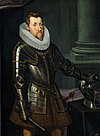 Ferdinand II |
9 July 1578 Graz Second son of Charles II and Maria Anna of Bavaria (I) |
10 July 1590 – 9 October 1619 |
Archduchy of Inner Austria | Maria Anna of Bavaria (II) 23 April 1600 Graz seven children Eleonora Gonzaga (I) 2 February 1622 Innsbruck no children |
15 February 1637 Vienna aged 58 | |
| 9 October 1619 – 1623 |
Archduchy of Austria | |||||
| 1623 – 15 February 1637 |
Archduchy of Lower and Inner Austria | |||||
 Leopold V |
9 October 1586 Graz Fifth son of Charles II and Maria Anna of Bavaria |
1623 – 13 September 1632 |
Archduchy of Further Austria | Claudia de' Medici 19 April 1626 Innsbruck five children |
13 September 1632 Schwaz aged 45 |
When he was chosen as archduke regnant, he abdicated his ecclesiastical status (as he previously held the Bishoprics of Passau and Strasbourg) in order to get married and have children. |
| Regency of Claudia de' Medici (1632–1646) | ||||||
 Ferdinand Charles |
17 May 1628 Innsbruck Eldest son of Leopold V and Claudia de' Medici |
13 September 1632 – 30 December 1662 |
Archduchy of Further Austria | Anna de' Medici 10 June 1646 Innsbruck two children |
30 December 1662 Kaltern aged 34 | |
 Ferdinand IV |
13 July 1608 Graz Third son of Ferdinand III and Maria Anna of Bavaria (II) |
15 February 1637 – 2 April 1657 |
Lower Austria and Inner Austria | Maria Anna of Spain 20 February 1631 Vienna six children Maria Leopoldine of Austria 2 July 1648 Linz one child Eleonora Gonzaga (II) 30 April 1651 Wiener Neustadt four children |
2 April 1657 Vienna aged 48 |
Also Holy Roman Emperor (1637–1657), and King of Hungary and Bohemia. |
 Sigismund Francis |
27 November 1630 Innsbruck Second son of Leopold V and Claudia de' Medici |
30 December 1662 – 25 June 1665 |
Archduchy of Further Austria | Hedwig of the Palatinate-Sulzbach 13 June 1665 Sulzbach no children |
25 June 1665 Innsbruck aged 34 |
Brother of the predecessor. After his death, his territories reverted to the elder line. |
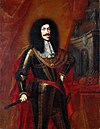 Leopold VI |
9 June 1640 Vienna Fourth son of Ferdinand IV and Maria Anna of Spain |
2 April 1657 – 25 June 1665 |
Archduchy of Lower and Inner Austria | Margaret Theresa of Spain 12 December 1666 Vienna four children Claudia Felicitas of Austria 15 October 1673 Graz two children Eleanor Magdalene of Palatinate-Neuburg 14 December 1676 Passau eleven children |
5 May 1705 Vienna aged 64 |
Also Holy Roman Emperor, and King of Bohemia and Hungary. In 1665, he unified Austria once more. |
| 25 June 1665 – 5 May 1705 |
Archduchy of Austria | |||||
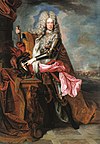 Joseph I |
26 July 1678 Vienna Eldest son of Leopold VI and Eleonor Magdalene of Neuburg |
5 May 1705 – 17 April 1711 |
Archduchy of Austria | Wilhelmina Amalia of Brunswick 10 June 1646 Vienna three children |
17 April 1711 Vienna aged 32 |
Also Holy Roman Emperor, and King of Bohemia and Hungary. |
 Charles III |
1 October 1685 Vienna Second son of Leopold VI and Eleonor Magdalene of Neuburg |
17 April 1711 – 20 October 1740 |
Archduchy of Austria | Elisabeth Christine of Brunswick-Wolfenbüttel 1 August 1708 Santa Maria del Mar, Barcelona five children |
20 October 1740 Vienna aged 55 |
Also Holy Roman Emperor, and King of Bohemia and Hungary. In 1700, he claimed the Kingdom of Spain in the War of Spanish Succession (1700–1713). |
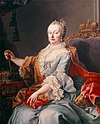 Maria Theresa with Francis I Stephen (1740–1765) Joseph II (1765–1780) |
13 May 1717 Hofburg Imperial Palace Eldest daughter of Charles III and Elisabeth Christine of Brunswick-Wolfenbüttel |
20 October 1740 – 29 November 1780 |
Archduchy of Austria | 12 February 1736 Vienna sixteen children |
29 November 1780 Hofburg Imperial Palace aged 63 |
Also Queen of Bohemia and Hungary. |
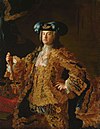 Francis I Stephen with Maria Theresa (1740–1765) |
8 December 1708 Nancy Fourth son of Leopold, Duke of Lorraine and Élisabeth Charlotte d'Orléans |
20 October 1740 – 18 August 1765 |
Archduchy of Austria | 18 August 1765 Innsbruck aged 56 |
Also Holy Roman Emperor (1740–1765). Exchanged his original Duchy of Lorraine for the Grand Duchy of Tuscany (1737). | |
| The Austrian agnatic branch ended in 1780 with the death of Maria Theresa of Austria and was replaced by a combination of the Austrian cognatic branch of the Habsburgs and the Vaudemont branch of the House of Lorraine in the person of her son Joseph II. The new successor house styled itself as Habsburg-Lorraine (Habsburg-Lothringen). All Habsburgs living today are in the agnatic descendants of Maria Theresa and Francis Stephen. | ||||||
| Ruler | Born | Reign | Ruling part | Consort(s) Child(ren) |
Death | Notes |
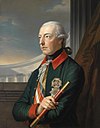 Joseph II |
13 March 1741 Vienna Eldest son of Francis I Stephen and Maria Theresa |
29 November 1780 – 20 February 1790 |
Archduchy of Austria (Habsburg-Lorraine) |
Isabella of Parma 6 October 1760 Vienna two children Maria Josepha of Bavaria 23 January 1765 Schönbrunn no children |
20 February 1790 Vienna aged 48 |
Co-ruling with his mother since the death of his father. Also Holy Roman Emperor (1765–1790). |
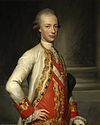 Leopold VII |
5 May 1747 Vienna Third son of Francis I and Maria Theresa |
20 February 1790 – 1 March 1792 |
Archduchy of Austria (Habsburg-Lorraine) |
Maria Luisa of Spain 16 February 1764 Innsbruck sixteen children |
1 March 1792 Vienna aged 44 |
Had a brief reign. Also elected Holy Roman Emperor (1790–1792). |
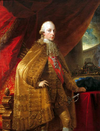 Francis II |
12 February 1768 Florence Eldest son of Leopold VII and Maria Luisa of Spain |
1 March 1792 – 11 August 1804 |
Archduchy of Austria (Habsburg-Lorraine) |
Elisabeth of Württemberg 6 January 1788 Vienna one child Maria Theresa of Naples and Sicily 15 September 1790 Vienna twelve children Maria Ludovika of Austria-Este 6 January 1808 Vienna no children Caroline Augusta of Bavaria 29 October 1816 Vienna no children |
2 March 1835 Vienna aged 67 |
In 1804 Francis adopted the new title Emperor of Austria, but kept the title of Archduke of Austria. In 1806 the Holy Roman Empire was dissolved. |
Emperors of Austria (1804–1918)
[edit]House of Habsburg-Lorraine
[edit]| Ruler | Born | Reign | Ruling part | Consort | Death | Notes |
|---|---|---|---|---|---|---|
 Francis I |
12 February 1768 Florence Eldest son of Leopold VII, Archduke of Austria and Maria Luisa of Spain |
11 August 1804 – 2 March 1835 | Empire of Austria | Elisabeth of Württemberg 6 January 1788 Vienna one child Maria Theresa of Naples and Sicily 15 September 1790 Vienna 12 children Maria Ludovika of Austria-Este 6 January 1808 Vienna no children (4) Caroline Augusta of Bavaria 29 October 1816 Vienna no children |
2 March 1835 Vienna aged 67 |
Following the dissolution of the Holy Roman Empire, Francis created his own Empire of Austria. |
 Ferdinand I the Benevolent |
19 April 1793 Vienna Son of Francis I and Maria Theresa of Naples and Sicily |
2 March 1835 – 2 December 1848 | Empire of Austria | Maria Anna of Savoy 12 February 1831 Turin (by procuration) no children |
29 June 1875 Prague aged 82 |
Abdicated due to the Revolutions of 1848. |
 Francis Joseph |
18 August 1830 Florence Son of Archduke Franz Karl of Austria and Princess Sophie of Bavaria |
2 December 1848 – 21 November 1916 | Empire of Austria | Elisabeth of Bavaria 24 April 1854 Vienna four children |
21 November 1916 Vienna aged 86 |
Nephew of Ferdinand I, and grandson of Francis I. |
 Charles |
17 August 1887 Persenbeug-Gottsdorf Son of Archduke Otto Franz of Austria and Princess Maria Josepha of Saxony |
21 November 1916 – 12 November 1918 | Empire of Austria | Zita of Bourbon-Parma 21 October 1911 Schwarzau am Steinfeld eight children |
1 April 1922 Funchal aged 34 |
Grand-nephew of Francis Joseph I, and great-great-grandson of Francis I. Following the defeat in World War I, the Empire was dissolved in 1918. |
See also
[edit]- Austrian nobility
- History of Austria
- Pragmatic Sanction of 1713
- List of Austrian consorts
- List of heirs to the Austrian throne
- List of presidents of Austria
- List of chancellors of Austria
- List of Marshals of Austria
- Symmetria iuridico Austriaca
References
[edit]- ^ Some sources state that he was disinherited, while giving no reason for that. It's possible that it this argument was an attempt to justifiy the unusual choice of young Leopold IV as successor to his father.
- ^ Continuatio Prædictorum Vindobonensium 1125, MGH SS, p. 725.
- ^ His epithet as no certain origin; it's possible that it derived from the oath joch sam mir got helfe ("Yes, so help me God")
- ^ Lyon 2013, p. 124.
- ^ Continuatio Scotorum 1227, MGH SS IX, p. 624
- ^ Continuatio Zwetlenses III 1252, MGH SS IX, p. 655.
- ^ Angold 2011, p. 54.
- ^ His numbering, if counted as I, reflects, not the ducal succession of the Babenbergs (being in fact the third ruler of Austria bearing this name), but of the comital Habsburgs, being the first member of the family with this name. However, he may have adopted his German numeral III in Austria, as the next de facto rulers of Austria who bore the same name styled themselves as Frederick IV and Frederick V. So, inadvertently, the numbering of de facto ruling Fredericks actually follow the Babenberg counting.
- ^ His numbering reflects, not the ducal succession of the Babenbergs (being in fact the seventh ruler of Austria bearing this name), but of the comital Habsburgs, being the first member of the family with this name.
- ^ Numbered III by including the titular duke Leopold II (1339–1344)
- ^ Numbered IV by including either only the de facto duke Frederick the Fair, sometimes numbered III, or by including the titular dukes Frederick (II) (1339–1344) and Frederick (III) (1347–1362).
- ^ Pavlac, Brian A.; Lott, Elizabeth S. (1 June 2019). The Holy Roman Empire: A Historical Encyclopedia. ABC-CLIO. pp. 255, 278. ISBN 978-1-4408-4856-8. Retrieved 13 November 2021.
- ^ Fichtner, Paula Sutter (7 March 2017). The Habsburg Monarchy, 1490-1848: Attributes of Empire. Macmillan International Higher Education. p. 8. ISBN 978-1-137-10642-1. Retrieved 13 November 2021.
- ^ In German Articles and Books these Archdukes' names and titles are normally completed with the territorial names of their Duchy as: "Charles II of Inner Austria" = "Karl der II. von Inner Österreich"
Works cited
[edit]- Angold, Michael (2011). "The Latin Empire of Constantinople, 1204–1261: Marriage Strategies". Identities and Allegiances in the Eastern Mediterranean after 1204. Farnham: Ashgate Publishing Limited. pp. 47–68. ISBN 978-1409410980.
- Lyon, Jonathan R. (2013). Princely Brothers and Sisters: The Sibling Bond in German Politics, 1100-1250. Ithaca and London: Cornell University Press. ISBN 978-0801451300.